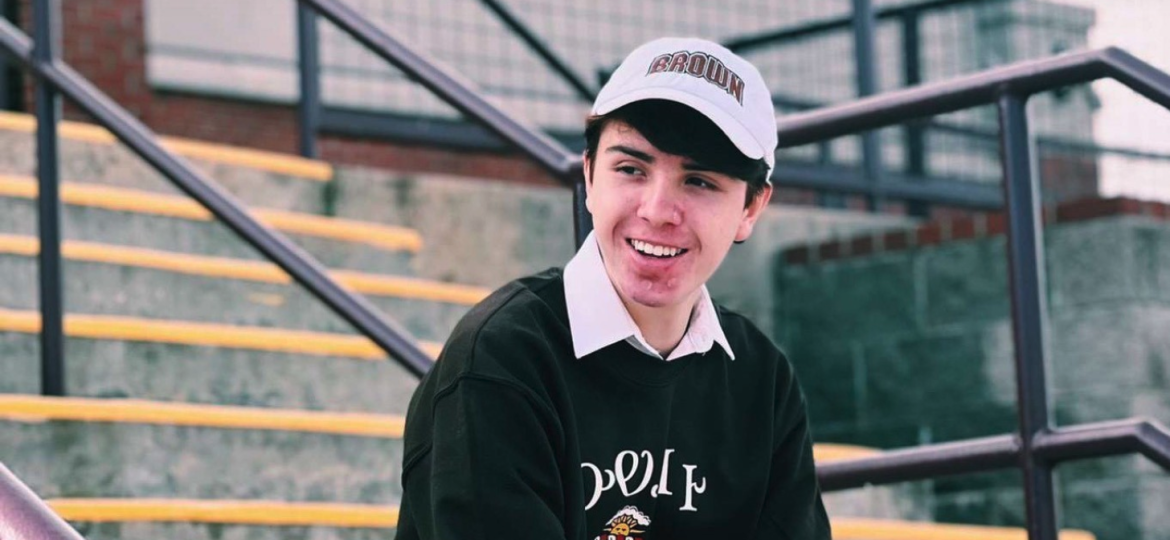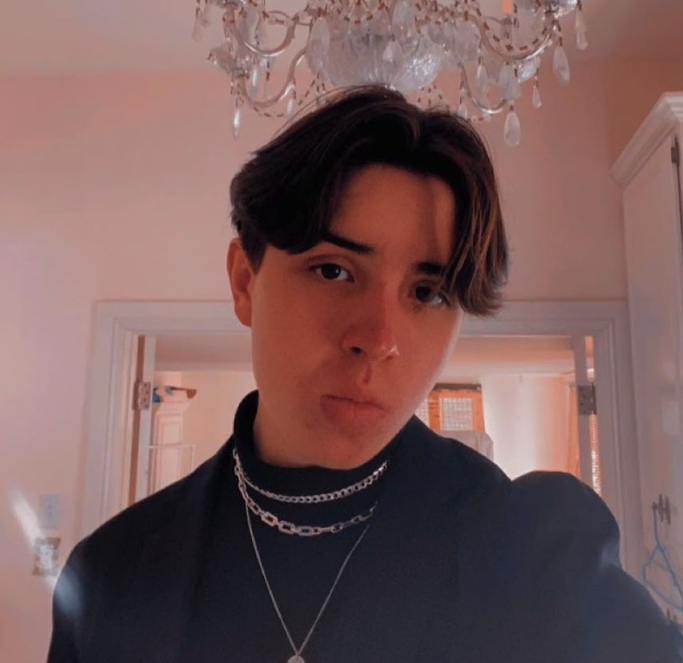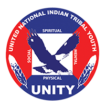
Brown University, March 3, 2023, Pictured, above: Anagali (Shace) Duncan smiles in Brown apparel at his high school athletic field. Sequoyah High School is a boarding school for Indigenous students in grades 7-12.

Meet 20-year-old environmental advocate
Anagali (Shace) Duncan of the Cherokee Nation.
“Respect, humility, and reciprocity describe Anagali best” shared Laura Smith, Program Coordinator with the Tribal Youth Resource Center (TYRC) Tribal Law and Policy Institute. “I serve as co-coordinator for the Tribal Youth Resource Center (TYRC) Youth Ambassadors and met Anagali when he became a Youth Ambassador with us in 2022″ she continued. “He has served as a TYRC Youth Ambassador over the last year and it has been an absolute pleasure to get to know him and witness his passion and growth. He believes deeply in the importance of reciprocity in all relationships, including our relationship with the earth. Moreover, Anagali is a kind, thoughtful, brilliant, and passionate young person who loves connecting with others.”
When UNITY asked Anagali what it mean to him to be an environmental ambassador, he replied:
Anagali: “Being an environmental ambassador is understanding the reciprocity to the land that is inherent to our communities. Environmental justice is intrinsic to our identity and is deeply rooted in the foundation of our people. It plays a crucial role not just in propelling us forward into the future, but also in reconnecting us to our ancestors. As indigenous people, we possess ancestral knowledge that holds the key to saving the world. It is our responsibility to fight for the land that provides so much to us. As an ambassador, I pledge to be guided by the wisdom of my ancestors and stay rooted in the values of my community. Having been raised with these values, I have come to appreciate the wonder of being a constituent of all creation. Recognizing that human beings are a manifestation of the earth’s magnificence, we acknowledge our sense of belonging, our ecological responsibility, and the interdependence between ourselves and the ecosystems we inhabit.”
Resiliency through Advocacy
Laura: “As part of his involvement as a TYRC Youth Ambassador, Anagali developed a presentation for the 2022 OJJDP Tribal Youth National Conference on “Resiliency through Advocacy: Impact of Climate Change on Community Health and Well-Being.” This presentation was developed in collaboration with his peers, and Anagali took the initiative to research, design, and create much of the PPT leading up to the session. As Tribal Youth Resource Center staff, I was present in a capacity to help support and facilitate as needed, but this was a completely youth-led process in terms of the topic selection and development of content, culminating in an in-person presentation in San Diego, CA, on December 14, 2022. The TYRC received very strong feedback on the session in our evaluation workshop responses.
Anagali’s passion for Environmental Stewardship
Laura: “Outside of his work with TYRC, Anagali has been exploring and pursuing his passion in environmental stewardship in multiple ways. I was very excited to recently learn that this coming summer, Anagali has been accepted to participate in an internship with Harvard Forest relating to traditional ways of stewarding land, working directly with the Nipmuc Nation. At Brown University, where Anagali is currently a freshman in college, he has become involved with the Sunrise environmental activism group this past school year. He traveled to Washington DC with other students in the organization to participate in a rally and march to the capitol on the importance of fossil-free research and related environmental issues.
Anagali has also shared with me about his outreach over the last semester to other undergrad and graduate students at Cornell and Harvard who grew up in the same area to connect and learn about how waters are being affected on the reservation back at home (for example, as a result of the Tyson Chicken company’s harmful practices). I understand that water protection is an area of passion for Anagali and may be an area of interest and focus for his community service project.”
UNITY asked: In what ways are you addressing environmental concerns within your tribe or local community?
Anagali: “The severe reduction of Indigenous lands has profoundly impacted the well-being of our communities’ mental health and the ecosystems we occupy, as it has disrupted our connection to our ancestral homelands. Most of my advocacy has revolved around reclaiming our traditional ways of self-care and showing the intersections that this has with the well-being of our environment. On December 14, 2022, I was allowed to speak to tribal and state officials in San Diego. In this presentation, I talked about my community’s connection to water – A vital part of our ceremonies. How large corporations have threatened our waters, and connecting this to how this results in many problems we face today on the reservation, such as cultural erosion, loss of intergenerational teaching, and native youth mental health. While I have been off the reservation for half a year, I immediately understood the importance of connecting to the lands of Providence, Rhode Island. I found that the best way to do this is through learning from the people who have inhabited the land for thousands of years. Brown University resides on the ancestral homelands of the Narragansett Indian Tribe and is neighbored by many other tribes, including the Wampanoag and Nipmuc tribes.
With My role as Co-Coordinator and freshman representative of the Natives At Brown (NAB), I have strengthened these connections with these communities by having weekly get-togethers where we have a community member come in and sit with the NAB students. While at Brown, I joined the environmental justice group, where I helped coordinate a protest in Washington, D.C., where we marched to the capital in demand of reducing fossil fuels. Within the Brown University community, I have done interviews with the Institute at Brown for Environment and Society (IBES) and called for more indigenous perspectives within the Environmental Studies Department. They Published my Interview on their IBES Website. Academically, I know That my future will be rooted in indigenous ecology and the advocacy for Indigenous perspectives within Environmental sustainability. Within my studies, I revolve my research on how Environmental insecurities affect indigenous communities, and with this, I have valued the communications with the communities I have worked with. In the Fall of 2022, I did a research project about how climate change affected Alaska’s salmon population. While doing this, I reached out to Yupik Community members to bring their perspectives on how it has affected their traditional ways of food sustainability.
This past February, I was selected to work with both the Nipmuc Community and Harvard University to research traditional ways that the Nipmuc Tribe has lived symbiotically with the land and show how that is more beneficial to the ecosystem in comparison to westernized environmental sustainability. Coming to an Institution that purposely excludes indigenous perspectives on environmental justice has shown me that this fight is necessary. Seeing how our people have been fighting for the same things for decades shows me that I am descended from resilience. Our communities have demonstrated remarkable resilience by striving to regain access, stewardship, and control over our lands. I understand that I have a responsibility to do my part in this generational movement.”
UNITY Asked what community project would you suggest to address these issues?
Anagali: “Many of my worries are released when I step into the cold, crisp water. I walk out to where the river reaches my thighs. The prayers my family and I sing would then fill the air. Amayi wodasdi (Going to water) is a ceremony my people do to cleanse our souls of negative feelings while also allowing us to connect with the water. As Cherokee people, we have traditionally had ways of life that have facilitated our people’s and the earth’s well-being. We understand that the choices we make as individuals must be sustainable for our ecosystem. We see the water not as just a natural resource but as familial. When I was seven, my father stressed that going to water was no longer safe. He said that our rivers were being poisoned by the Tyson Chicken Company dumping waste into the water. Without the ability to amayi wodasdi, we are deprived of this form of traditional self-care, and our spirits are deprived of a vital part of our being. Going to water shows us that our health is directly related to the health of our earth. This symbiotic relationship is deeply rooted in the Cherokee people’s relation to mental health and our connection to the land.
When I researched this, I saw that the Oklahoma Government had created a midnight rider clause, which is part of a transportation bill that requires Oklahoma tribes to get permission from the state to conduct or implement environmental programs. In short, it reduces the sovereignty of tribes to oversee their environmental protection efforts. Going to water shows us that our health is directly related to the health of our earth. We are in relation to everything all the time, and we need to start looking at how living in toxic environments can affect the mental health of our communities. This story is foundational to my motivation to protect our waters. If awarded, I want my community project to include the protection of the waterways of the Northeast Oklahoma Reservations.”
UNITY wishes Anagali all the best in his future endeavors. His advocacy is an inspiration to Native youth everywhere.
Photo credit: The header photo is linked to an article featuring Anagali. Click to learn more.

